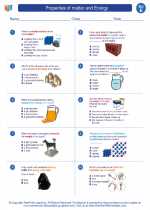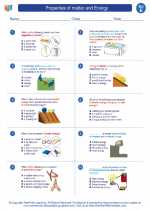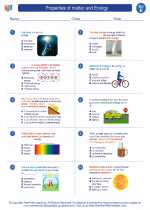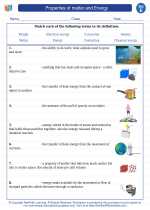Properties of matter and Energy -> electrical
Electrical
Electricity is a form of energy that is essential to our modern way of life. It powers our homes, schools, and workplaces, and is used in a wide variety of devices and technologies. Understanding the basics of electricity is important for both everyday life and scientific knowledge.
Key Concepts
- Electricity: Electricity is the flow of electric charge through a conductor, such as a wire. It can be produced by generators and batteries.
- Circuits: An electrical circuit is a path that allows electricity to flow. It typically includes a power source, such as a battery, a load, such as a light bulb, and wires to connect them.
- Conductors and Insulators: Conductors are materials that allow electricity to flow through them easily, while insulators are materials that do not conduct electricity well. Understanding these properties is important for electrical safety and design.
- Electric Current: Electric current is the flow of electric charge through a conductor. It is measured in units called amperes (A).
- Voltage: Voltage is the electric potential difference between two points in a circuit. It is measured in units called volts (V).
- Resistance: Resistance is the opposition to the flow of electric current. It is measured in units called ohms (Ω).
Study Guide
To master the topic of electricity, it's important to understand the following:
- Describe the flow of electric charge and the concept of electric current.
- Explain the difference between conductors and insulators and give examples of each.
- Understand the components of a basic electrical circuit, including the roles of the power source, load, and wires.
- Define voltage and explain its importance in electrical systems.
- Discuss the concept of resistance and its effects on electrical circuits.
- Identify common electrical devices and technologies in everyday life and explain how they work based on the principles of electricity.
By mastering these concepts, you'll have a solid foundation in understanding the basics of electricity and its practical applications.
.◂Science Worksheets and Study Guides Fifth Grade. Properties of matter and Energy
Study Guide Properties of matter and Energy
Properties of matter and Energy  Worksheet/Answer key
Worksheet/Answer key Properties of matter and Energy
Properties of matter and Energy  Worksheet/Answer key
Worksheet/Answer key Properties of matter and Energy
Properties of matter and Energy  Worksheet/Answer key
Worksheet/Answer key Properties of matter and Energy
Properties of matter and Energy  Vocabulary/Answer key
Vocabulary/Answer key Properties of matter and Energy
Properties of matter and Energy  Vocabulary/Answer key
Vocabulary/Answer key Properties of matter and Energy
Properties of matter and Energy 

 Worksheet/Answer key
Worksheet/Answer key
 Worksheet/Answer key
Worksheet/Answer key
 Worksheet/Answer key
Worksheet/Answer key
 Vocabulary/Answer key
Vocabulary/Answer key
 Vocabulary/Answer key
Vocabulary/Answer key

The resources above cover the following skills:
PHYSICAL SCIENCE (NGSS)
Matter and Its Interactions
Students who demonstrate understanding can:
Develop a model to describe that matter is made of particles too small to be seen.